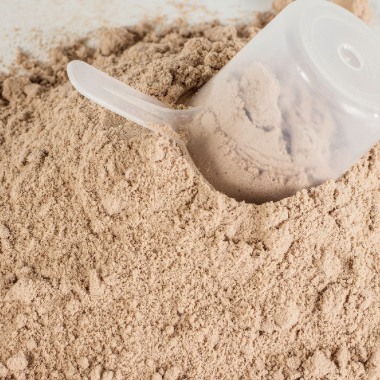In the last few years, protein powders have come out of the gym and into the kitchen. No longer just for athletes and weight lifters, protein has proven health benefits for all.
Protein accounts for the largest percentage of material in the human body next to water —about 45%. It contains valuable amino acids and is vital for immune function, building and healing tissue, and oxygen transport to muscles. Supplementing with whey protein can also preserve lean muscle and supply energy during exercise or periods of compromised health.
More strength & energy
Whether you’re an athlete or not, you may be looking for more strength and energy to get you through the day. Research shows that using whey protein may help in either case. In a recent study, whey protein helped a test group of males increase certain measures of strength and lean tissue mass. Other research shows that whey protein supplements are beneficial to anyone with a reduced appetite, including the elderly or even cancer patients undergoing chemotherapy.
Whey boosts immunity
An added benefit of whey protein is enhanced immune function. Studies indicate that whey protein raises levels of glutathione, the body’s own powerful antioxidant that is central to immune function. Glutathione levels decrease with age, and lower levels are common in people with multiple sclerosis, ALS, Parkinson’s, Alzheimer’s and those living with AIDS. Because glutathione supplements are not easily absorbed, some experts suggest using substances that boost the body’s natural glutathione levels — such as whey.
Other components of whey protein include alpha-lactalbumin, lactoferrin and tryptophan. These “micro-factors” also play a role in enhancing immunity and improving health. Alpha-lactalbumin is especially beneficial and can help regulate appetite, sleep and mood.
Is whey the only way?
Soy protein is also a great choice, particularly for vegetarians or those who want the intake of soy isoflavones. However, whey protein is generally considered to be better utilized by the body. Although whey is derived from milk, most whey protein powders contain very little, if any, lactose. This means that most “lactose intolerant” people can still enjoy the health benefits of whey protein. Many different types of whey protein are now available featuring various protein concentrations and processing techniques. Some also include soy protein to bring the benefits of soy isoflavones into the daily mix. Ask your natural products store staff to help you choose the best product for your needs.
Sources: Int J Sport Nutrition & Exercise Metabolism 2001:11(3); Dr Murray’s Total Body Tune-Up by M Murray, Bantam:2001; Earl Mindell’s Supplement Bible by E Mindell, Fireside:1998

